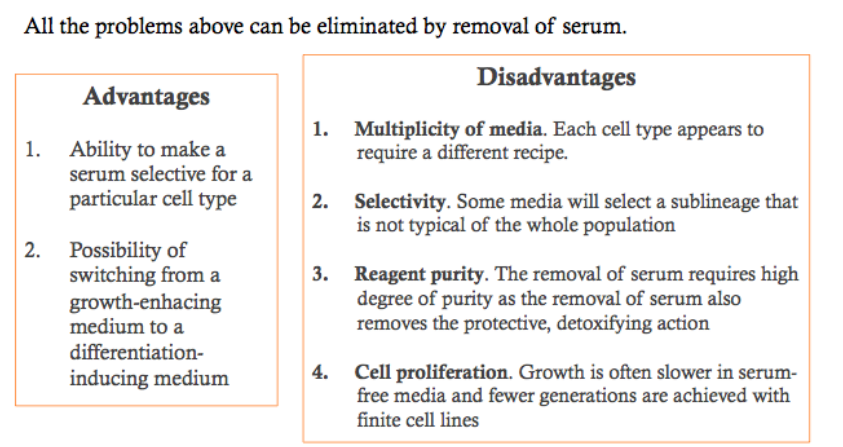Lecture 7 Serum-free media, Defined media supplements
Lecture 7 Serum-free media, Defined media supplements
- Media development
- tissue extract, body fluid
- Eagle MEM→calf, human, horse serum, protein hydrolysate, embryo extract
- serum-free→facilitate downstream process & reduce risk of adventitious infectious agents
- Physiochemical
- pH
- normal fibroblast 7.4 to 7.7
- transformed 7.0 to 7.4
- phenol red at 7.4, orang at 7, yellow at 6.5, lemon yellow <6.5, pink at 7.6, purple at 7.8
- buffer
- open dish→CO2 cause pH high
- overproduction of CO2 & lactic acid in transformed cell lines at high cell concentrations
- bicarbonate HCO3 buffer
- widely use
- requires CO2 incubation
- pH 7.2-7.4
- inexpensive, non toxic
- pH fluctuation when expose to air
- HEPES
- pH 6.8-8.2
- more stable than HCO3
- w/o CO2 incubation
- better pH stability, less sensitive to temp
- more expensive, potential toxicity at high concentrations
- phosphate buffer
- pH 6.8-7.4
- less common
- stable, inexpensive
- can interfere with certain cellular process
- maintain optimal pH, critical for cell growth, metabolism, overall health
- purpose
- stabilize pH
- counteract pH changes from cellular metabolism
- maintain optimal conditions for cell growth & function
- CO2 HCO3
- CO2 in gas phase dissolves in medium, establish equilibrium with HCO3→lowers pH
- effect of elevated CO2 tension neutralized by high HCO3 concentration
- inclusion of high concentration of Na pyruvate enable cells increase CO2→independent of exogenous CO2 & HCO3
- O2
- anaerobic, glycolysis for energy production, O2 still need
- dissolved O2 may be toxic→elevation of free radicals
- incorporation of free radical scavengers (glutathione, beta mercaptoethanol or dithiothreitol) into medium
- most cell prefer lower O2, some organ cultures require >95% O2 in gas phase, some tumor cells prefer hypoxic
- Osmolality
- cell growth, metabolism, protein production
- concentration of osmotically active particles in a solution→mOsm/kg
- mammal 260-320
- effects
- low→cell swell & lysis
- high→cell shrink, reduce growth rate
- factors
- base media composition
- serum/protein supplement
- added nutrient/GF
- pH adjustment
- accumulation of metabolic by product
- hypotonic for open-plate/petri dish
- Temperature
- optimal depends on
- body temp
- anatomic variation
- incorporation of safety factor to allow for minor errors in regulating incubator
- +-5C
- overheating more serious→mammalian cells can survive several days at 4C but cannot tolerate more than 39.5C for >2h
- most maintain at 37C
- avian cell 38.5C
- cold blood animal 15C to 26C→maintain at room temp/cool incubator
- influence pH due to increase CO2 solubility at low temp
- decrease pH to 0.2 unit lower at RT than at 37C
- optimal depends on
- Viscosity
- cell growth
- cell suspension is agitated
- cells are dissociated after trypsinization
- cell damage reduce by increasing viscosity with CMC/PVP
- Surface tension & foaming
- foaming arise in stirrer vessel/bioreactor when 5% CO2 bubbled
- limit gaseous diffusion, increase contamination if foam reach neck
- +silicone antifoam, pluronic F68→reduce surface tension, protect cells from shear stress of bubbles
- pH
- Balanced salt solution BSS
- pH & salt concentration
- composed of inorganic salt & may include NaCO3, glucose
- form basis of complete media
- modified by omitting glucose, phenol red, Ca2+, Mg2+
- deficient in Ca2+ reduce cell aggregation & attachment
- EMEM Hank's salt→sealed flask with a gas phase of air
- EMEM Earle's salts→higher HCO3 with 5% CO2
- HEPES (10-20mM)→pH 7.2-7.8
- tricine pH 7.4-8
- function
- diluent for concentrates of aa & v to make complete media
- isotonic wash/dissection medium
- short incubation >4h with glucose present
- Complete media
- aa
- essential aa + cysteine, arg, glu, tyr
- aa concentration limit max cell concentration attainable→cell survival & growth rate
- glu→energy & carbon source, unstable as generate NH
- glutamax→alanyl-glu dipeptide; stable & bioavailable
- v
- EMEM→water soluble VB exclude biotin
- biotin, PABA, fat-soluble VADEK in complex
- precipitation of folate reduce cell survival & growth rate
- salt
- Na K Mg Ca Cl SO PO HCO3
- Earle's→high HCO3, 5% CO2 at gas phase
- Hank's→low HCO3, air at gas phase; BSS
- Ca2+ required by CAM→signal transduction, cell proliferation, differentiation
- glucose
- energy source
- glycolysis→pyruvate to lactate/acetoacetate, enter TCA, produce CO2 + H2O
- organic supplements
- protein, peptide, nucleoside, TCA intermediate, pyruvate, lipids when serum concentration reduce
- hormones & GF not specified
- Ab
- reduce frequency of contamination
- encourage Ab-resistant
- hide presence of low level cryptic contaminant
- hide mycoplasma
- antimetabolic
- encourage poor aseptic technique
- aa
- Serum
- growth factor
- cell proliferation, adhesion factors, antitrypsin activity
- small amount
- PDGF
- growth hormone
- in conjunction with somatomedin IGF→mitogen
- hydrocortisone promotes cell attachment and proliferation
- CS BS
- protein
- major
- increase viscosity, reduce shear stress, add to medium's buffering capacity
- albumin→carrier of lipid, mineral, globulin
- fibronectin→promotes cell attachment
- a2-macroglobulin→inhibits trypsin
- transferrin + Fe→less toxic & bioavailable
- nutrients & metabolites→important in simple media, less in complex
- lipid→bound to proteins (albumin)
- minerals→bound to albumin
- inhibitors
- inhibit cell proliferation
- artifact preparation/physiological negative growth regulators (TGF-B)
- heat inactivation removes complement (-labile constituent) & reduces cytotoxic action of Ig w/o damage polypeptide growth factors
- disadvantage
- physiological variability
- shelf life & consistency
- QC
- specificity
- availability
- downstream processing
- contamination→virus
- cost
- growth inhibitors
- standardization
- growth factor
- Selection
- RPMI 1640, DMEM, MEM→75% sales
- cell bank
- FBS more expensive then FCS
- ready made expensive than powder
- quality of serum can be tested by plotting growth curve, perform specific functional assays, examine sterility
- Serum free media



Comments
Post a Comment